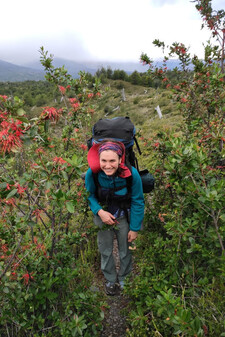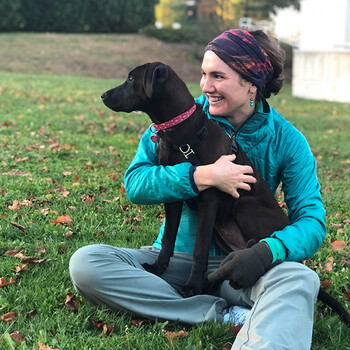Q&A: Hannah Duncan ’21 on Imagining Alternatives to Punishment

Hannah Duncan ’21, the 2022–23 Curtis-Liman Clinical Fellow, is based at the Office of the Federal Public Defender for the District of Connecticut in New Haven as well as at Yale Law School. When a student at YLS, she was a co-chair of the Asylum Seeker Advocacy Project and a student director of the Liman Center. Before the fellowship, she clerked for Judge Andrew D. Hurwitz of the United States Court of Appeals for the Ninth Circuit. Next year, she will clerk for Judge John G. Koeltl of the United States District Court for the Southern District of New York.
The Curtis-Liman Fellowship enables law school graduates to work with members of the Yale clinical faculty and the Liman Center on issues related to criminal law and immigration.
What inspired you to become a Liman Fellow?
So many reasons! The first two are learning from the community of Liman Fellows and the opportunity to engage in critical and challenging conversations about criminal justice reform. While in law school, I interned for several different public defender organizations. At each, I was struck by the number of times I encountered an attorney or advocate with a connection to the Liman Center. That showed me that Liman Fellowships provide participants with opportunities to network across geographies and to problem solve collectively.
I also benefited so much from the Liman Center’s research and academic programming while in law school. During my second year, I enrolled in the Liman Workshop Criminal Systems at a Crossroads, taught by Anna VanCleave, Jamelia Morgan, and Ali Harrington. Each instructor brought a range of experiences — from direct representation and research to efforts at systemwide reform. The workshop provided me with the rare opportunity to reflect on clinical experiences while engaging with academic scholarship and legal doctrine. My current fellowship project is in many ways inspired by these experiences with the Liman Center.
Tell us more about your work at the Office of the Federal Public Defender for the District of Connecticut in New Haven.

As a Curtis-Liman Clinical Fellow at the Office of the Federal Public Defender (FDO), I support clients sentenced to what is called supervised release and probation, which means that remaining outside of prison depends on fulfilling conditions imposed. This practice has led many to refer to supervised release as one of several mechanisms that have widened the net of mass incarceration because many people may be sent back to prison for allegedly not complying with all the many rules.
I am focused on increasing alternatives to custodial punishment, and I work with attorneys, mitigation specialists, investigators, clients, and community members to improve access to social services. At FDO, I explore how, in some cases, supervised release can undermine efforts of rehabilitation and violate constitutional protections under the Fifth and Sixth Amendments. For example, I will track cases in which judges impose punitive conditions of release, enforce compliance without consideration of a client’s intellectual or physical disability, and when revocation may violate rights to jury trials and other constitutional protections.
For those in custody, I work with experts and mitigation specialists to reframe the underlying “offense conduct” as symptomatic of social deprivation, poverty, and mental illness—instead of ascribing criminal behavior to a client’s personal failing. By identifying options such as inpatient and outpatient mental health services, I can help educate the court and other criminal justice stakeholders about the harm caused by incarceration and the possibility for rehabilitation if clients are given access to noncoercive services.
I also work with clients outside of prisons who are serving terms of supervised release or probation. I develop plans to help them reintegrate into the community, challenge some of the conditions of their release, and identify where to find services. In addition to representing clients, I work with community members and other legal organizations to explore legal challenges to supervised release and other forms of noncustodial punishment.
How did you first become interested in these issues?
I grew up as the daughter of a public defender, in Phoenix, Arizona. My mother shared stories of her clients with my sister and me — teaching us about the multisystemic barriers facing individuals and families who were entangled in the criminal justice system. Through her example, I learned that public defenders could demand accountability from criminal justice stakeholders and that public defenders never left their clients’ side, even when every other institution turned them away.
Later, when I went to college and law school, I continued to pursue work and research at the intersection of social safety net programs and sentencing reform. At Yale Law School, I participated in the Challenging Mass Incarceration Clinic for two years. Under the supervision of Professor Miriam Gohara, Carly Levenson, and Kelly Barrett, I learned how to integrate a client’s social history and reentry plan into “sentencing mitigation,” which means presenting information to judges on why a harsh sentence is inappropriate. I also participated in research with Professor Anne Alstott that was related to a medical-legal partnership at the Yale Child Study Center. There, I began to understand the close relationship between early childhood experiences, mental illness, and the multigenerational harms caused by incarceration.

In your role as Curtis-Liman Clinical Fellow, how will you involve current Yale Law School students in your project?
I will work with a cohort of students enrolled in the Liman Projects course and interning in the Federal Defender’s Office. The goal is to build a more comprehensive database for the office and its clients that can show judges options other than incarceration and strict conditions for those on supervised release and probation. This database will include employment, mental health, substance use, housing, and educational resources for clients. Students will help by seeking out experts across Yale’s different programs, researching best practices in other jurisdictions, and visiting substance use and residential treatment programs in Connecticut.
Yale Law School students can be involved in every aspect of this project. One of the wonderful things about the law school is that students bring with them such diverse life, work, and educational experiences. These experiences can shape how public defenders imagine alternatives to custodial and noncustodial punishment.
What do you enjoy about being back in New Haven?
The best part of moving back to New Haven is returning to the people, place, and work I know and love. My partner is an LL.M. student at YLS, and spending time with an international cohort of LL.M. students has broadened my horizons with respect to criminal justice reform and other policy issues. Finally, I missed running up East Rock and swimming in the Long Island Sound! New Haven is spectacular, and returning to this city is a dream come true.


